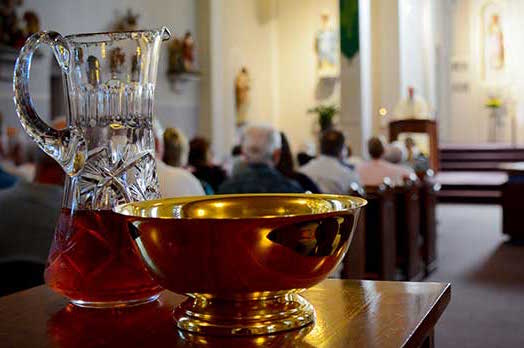The Real Presence of Christ in the Eucharist
Note: This the third part of a five-part series exploring the Real Presence of Jesus Christ in the Eucharist.
The Church teaches that only baptized Catholics in a state of grace may be admitted to Holy Communion. It can sometimes make for awkward moments at weddings or funerals, where non-Catholic guests, many of whom are devout Christians, feel shut out from the Eucharistic banquet.
On the surface, it is hard not to see this teaching as exclusionary — the reservation of subscribers-only perks. In reality, it’s exactly the opposite. It is an act of charity, and an invitation for deeper exploration of Catholic teaching on the Eucharist itself.
So if the Eucharist is so amazing, why don’t we want everyone to have it? The short answer is this, said Fr. Andrew Linn, associate pastor of St. Mary and St. Anthony Parishes in Menomonee Falls: we do want everyone to have the Eucharist.
“But we want them to have the Eucharist fully,” said Fr. Linn. “We want them to be fully united with Christ. You have to accept what the Eucharist is in order to receive the fullness that he offers you through grace in giving you himself Eucharistically.”
The only way to do that is to be baptized and catechized. It’s more than a simple stroll up to the sanctuary.
“We want the fullest life possible for those who are not Catholic,” said Fr. Michael-Joseph Paris, OCD, a Carmelite priest who serves at the Basilica and National Shrine of Mary Help of Christians. “Communion means we want to be in Communion with Christ and his whole Body the Church. If a non-Catholic believes and desires the Holy Eucharist, it flows from this that they would believe in all the rest of the faith of the Church. And so it is charitable to ask them to wait so that their desire for the Eucharist can lead them to the fullness of the faith and sacramental life of the Church.”
“True charity is willing what is good for another person,” said Fr. Jacob Strand, pastor of Holy Trinity and St. Michael Parishes in Kewaskum. “Truly loving a non-Catholic who belongs to a Protestant faith community, for example, means delicately and sensitively encouraging that person to consider entering full Catholic Communion. We should pray every day for the union of all Christians in the Catholic faith. Because the Eucharist unites us in the Body of Christ, which is the Church, it also signs our union in the Catholic faith. If we are not united in faith, then the sign is deficient.”
The same theology applies to a Catholic who is not in a state of grace. For a Catholic who has committed a mortal sin (defined as a grave action that is committed in full knowledge of its gravity and with the full consent of the sinner’s will) to approach the Eucharist “is a danger, because it is a lie,” said Fr. Paris.
“Our actions have intrinsic meaning built into them. By receiving Communion we are saying ‘I love you, Jesus, and want to be united to you fully,’ but if we are choosing mortal sin at the same time, then we totally contradict ourselves,” he said.
“Anytime you hurt someone, you ask forgiveness and seek reconciliation before your relationship with him or her can continue,” said Fr. Strand. “In a similar way, we need to ask the Lord’s forgiveness through Sacramental Confession to be reconciled to him before receiving him in the Eucharist. To receive the Lord’s most precious gift without having first been reconciled to him would be such a terrible act of disrespect that it traditionally has been described as a form of sacrilege.”

